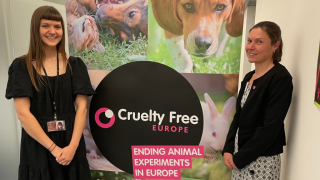
Our science team continues to advocate for the replacement of animal tests with non-animal methods at important meetings with European institutions and agencies to ensure that animal-free science remains central to the European Union’s plans.
At a recent meeting of the National Contact Points (NCP) for the Directive on the protection of animals used for scientific purposes, held by the European Commission in Brussels, we shared our new report on the serious animal welfare concerns linked to gavage – a widely used force-feeding method for administering substances in toxicity testing. We believe that this analysis provides clear evidence that it should be classified as more severe than its current ‘mild’ rating.
We also presented our Replace Animal Tests (RAT) List, which prompted constructive discussions to help us move closer to ending some of these tests on animals that continue despite the availability of non-animal replacements.
Additionally, we attended a meeting of the Committee for Veterinary Medicinal Products (CVMP), part of the European Medicines Agency, in Amsterdam. This was on behalf of the International Council on Animal Protection in Pharmaceutical Programs (ICAPPP), where we hold a leading role as Secretariat. We discussed efforts to replace the use of animals in veterinary medicine testing, including updates to EU and international testing guidelines, as well as progress on the roadmap to phase out animal testing for chemical safety assessments.
Our Senior Science Advisor, Kate Shipton, who attends both NCP and European Medicines Agency meetings, said: “These regular meetings are a vital part of our ongoing work to end animal testing and advance animal-free science. The feedback we receive from EU regulators and officials highlights the value of our contributions toward a future that spares animals from suffering and protects human, animal and environmental health.”
